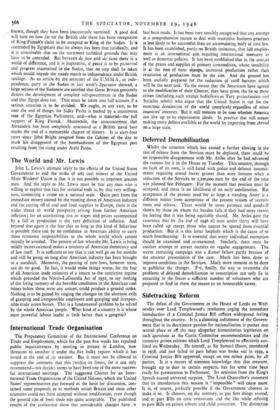Deferred Demobilisation
Whilst the situation which has caused a further slowing in the rate of release from the Services must be deplored, there could be no responsible disagreement with Mr. Attlee after he had advanced the reasons for it in the House on Tuesday. This country, through no fault of its own, is still faced with police and defence commit- ments requiring armed forces greater than were forecast when a reduction of the Services to i,soo,000 men by the end of the year was planned last February. For the moment that position must be accepted, and there is no likelihood of an early amelioration. But acceptance of the present need for so large a standing Army is a different matter from acceptance of the present system of recruit- ment and release. There would be more patience and goodwill shown by those on whom the burden falls if they had more reason for feeling that it was being equitably shared. Mr. Attlee gave the assurance that by .he end of 1946 all men under thirty will have been called up except those who cannot be spared from essential production. But it is this latter loophole which is the cause of so much heartbuming. It is essential that every individual exemption should be examined and re-examined. Similarly, there must be another attempt to attract recruits on regular engagements. The recent recruiting campaign was a dismal failure partly because of the amateur presentation of the case. Much has been done to improve conditions in the Services. Much more remains to be done to publicise the changes. Fqr, finally, the way to overcome the problems of delayed demobilisation or conscription can only lie in attracting to the forces a sufficient number of volunteers who are prepared to find in them the means to an honourable career.


































 Previous page
Previous page